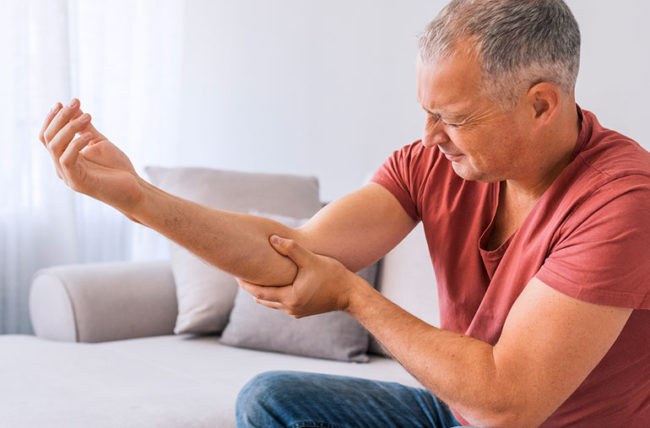Do you ever experience elbow pain when lifting heavy things? If so, you’re not alone! In this blog post, we will discuss the causes of elbow pain when lifting and some tips to help prevent it.
Contents
What Are The Reasons For Your Elbow Pain
Whether you’re a weightlifter, a nurse, or just someone who loves to pick up heavy things from time to time, elbow pain is something that can be an unwelcome distraction. It can also stop you from working out and enjoying your favourite activities, which is both frustrating and discouraging.
11 Reasons why elbow hurts from lifting heavy objects:
Lifting Heavy Things
Lifting heavy things puts a lot of strain on your muscles and joints, especially if you are doing it repeatedly or over time.
Improper Alignment
If your elbow joint is not in proper alignment or there are other underlying issues with the tendons and ligaments in your arm, this can also make it more vulnerable to pain from heavy lifting.
Pressure On Wrist
Lifting heavy things often require you to use your wrists, which can put added pressure on the elbow joint and exacerbate any pain or discomfort.
Improper Form
If you are not using proper form when lifting or putting strain on a certain part of your body, this can also contribute to elbow pain from lifting heavy things.
Strained Muscles
Repetitive motions, such as constantly lifting heavy objects, can strain your muscles and tendons over time and lead to inflammation that causes pain and discomfort in the elbow joint.
Dislocated Shoulder
You can also be experiencing pain when you have a dislocated shoulder, or you have rheumatoid arthritis, a bone spur, osteoarthritis or another joint pain issue.
Underlying Medical Conditions
Sometimes elbow pain from lifting heavy objects can be caused by an underlying medical condition such as bursitis, tendinitis, or carpal tunnel syndrome, and it is important to consult with your doctor if this is the case.
Trapped Nerve
” Pinched nerve” or a trapped nerve can be another reason for your elbow pain. The symptoms can include a tingling sensation, numbness and weakness in your arms.
Fractured Elbow
Having a fractured elbow can lead to discomfort and even pain when it’s made to work before its healing time.
Arthritis
Arthritis affects bones in many ways. Forcing your elbow to move in the direction it is stiff at, can make it ache.
Broken Ligament
Sometimes, the pain can be because of a broken bone or torn ligaments.
Overall, there are many different reasons why lifting heavy objects can cause elbow pain and discomfort, from overuse to underlying medical conditions. Whether you’re dealing with acute elbow pain from an accident or injury or general soreness from repetitive motions, it is important to listen to your body and take steps to address the causes of any pain that you may be experiencing. By doing so, you can get back to enjoying the activities you love without discomfort or limitations.
What Is The Medical Name For This Issue?
When you get a sharp pain due to lifting heavy, it’s called “Lateral Epicondylitis” or “Tennis Elbow”. Lateral Epicondylitis is caused by repetitive motions that stress the tendons, muscles and ligaments of the forearm. This happens when you do activities like using the computer mouse, or when you lift heavy things.
If you are experiencing frequent pain in your elbow and it gets worse when you lift heavy things, talk to your doctor about treatment options for lateral epicondylitis. This might include physical therapy, exercises to help strengthen the muscles around your elbow, and medications.
How Do I Stop My Elbow From Hurting?

The best way to prevent yourself from hurting your elbows when you lift heavy things is to stay in good physical condition. This can be done by:
Exercising regularly
It is important to keep your muscles and tendons strong, through regular exercises like cardiovascular workouts, strength training and stretching. Some of the physio exercises to relieve pain from hurting the elbow are:
- Elbow Extensions
- Wrist Flexion
- Supination/pronation with elastic band
- Supination/pronation with dumbbell
- Supination/pronation with a broomstick
- Scapula retraction
- Supination/pronation with fists
- Supination/pronation with arms
If these exercises do not bring relief, talk with a doctor.
Maintaining a good posture
When you are lifting heavy things, it is important to maintain proper form and posture in order to avoid putting too much strain on your elbow joints and tendons. This can be done by engaging your core muscles, keeping your back straight, and focusing on lifting from your legs rather than your arms.
Using proper technique
In order to prevent elbow pain when lifting heavy things, it is important to always use the correct form and technique. This can include using a wide stance for stability, bending at the knees and hips, and taking your time to lift small items instead of trying to rush through a big load.
Talk to your doctor
If you continue to experience pain or discomfort in your elbows when lifting heavy things, it is important to consult with a medical professional for advice and treatment options. They may recommend physical therapy, medications, or other therapies that can help alleviate your elbow pain and prevent further injury.
If you are experiencing elbow pain when you lift heavy things, there are many treatment options available to help you with pain. These may include physical therapy, exercises to strengthen the muscles around your elbow, medications like anti-inflammatory drugs or corticosteroids, and other therapies.
Can A Physio Fix Tennis Elbow?

Lifting heavy things can be a necessary part of your job or even just life in general. But it can sometimes leave you with elbow pain that doesn’t seem to go away. There are some things you can do to help relieve the pain and hopefully, stop it from coming back after lifting – read on to find out how!
When you experience elbow pain, it is usually caused by something called tennis or golfer’s elbow. Physiotherapy will help to relieve the pain and get your muscles back to normal.
Rest
The first step is rest – avoid activities that make the pain worse, and try to minimize any lifting or bending of the arms. You can also apply ice packs or heat wraps to help with any inflammation or soreness in your elbow.
Work On Muscles
Once you have rested up a bit, you can start working on your muscles to get them stronger. This will help to prevent injuries in the future and reduce any pain that you might still be feeling.
Listen To Physiotherapist
Your physiotherapist will recommend some exercises for you to do, which may include stretching or strengthening certain muscle groups. If there is a specific motion that aggravates your elbow, your physiotherapist may also give you some tips on modifying your actions to prevent pain.
How Long Does It Take To Heal A Hurt Elbow?

Depending on the severity of the pain and the cause of the pain, you might be able to recover from your elbow pain within a few hours or it can take weeks and even months. To heal quicker from tennis elbow you can take anti-inflammatories like ibuprofen. You can also wear a brace to help reduce pain and inflammation in the elbow. This will help you in limiting movements that cause the tendon to aggravate. Take proper rest before using that elbow again, and put ice packs on the elbow to reduce inflammation and pain. Massaging your arm may also help relieve pain and tension in your elbow. Consult a doctor who might give you an injection or surgery, but this is rarely needed for tennis elbow.
Conclusion
In conclusion, if you get elbow pain when lifting heavy things, it could be related to a variety of factors. If the pain does not reduce after a few days or becomes more intense, consult with a doctor.
Physical Therapy help patients recover from pain. If you’re experiencing Back pain, Shoulder pain, Knee pain, Neck pain, Elbow pain, Hip pain, or Arthritis pain, a physical therapist at MantraCare can help: Book a physiotherapy session.


